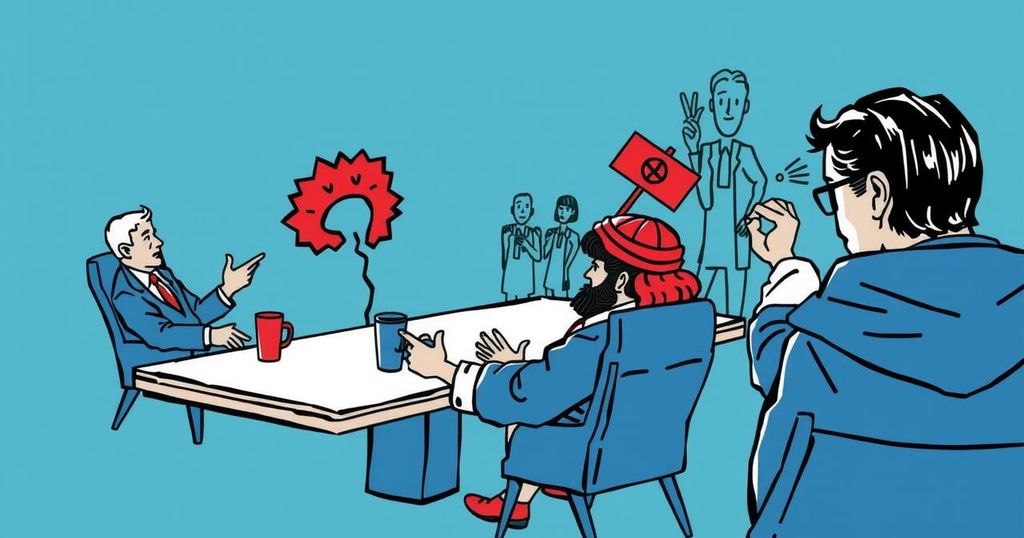COP29: Human Rights Groups Alarmed by Azerbaijani Government’s Repression of Activists

Human rights groups are sounding alarms over Azerbaijan’s repression of climate activists during COP29, marking a troubling trend of host nations undermining civil liberties. The Azerbaijani government denies claims of political prisoners despite opposition protests and detentions escalating. The ongoing oppression has raised concerns over the impact on civil society engagement integral to effective climate action, prompting calls for a reevaluation of host country selection criteria.
Human rights organizations are raising alarms regarding the Azerbaijani government’s crackdown on environmental activists and political opponents coinciding with the COP29 climate summit. This is the third consecutive year where a host nation has faced accusations of suppressing dissent during the conference. The Climate Action Network has emphasized that safeguarding civil society is paramount for achieving meaningful progress on climate change. While the Azerbaijani authorities deny these claims, asserting that no political prisoners exist, numerous activists continue to face arrest and harassment. The annual COP conference has seen a troubling trend of increased repression aimed at dissenters, with the overall count of political prisoners in Azerbaijan exceeding 300, as reported by The Union for Freedom of Political Prisoners. Human rights advocates have criticized the situation, pointing out that individuals like Gubad Ibadoglu, an academic, remain detained on what they claim are unfounded charges to silence critical voices. Environmentalists continue urging the Azerbaijani government to reduce its dependency on fossil fuels, as the country plans to escalate its natural gas production. A significant number of civil society figures have been sidelined or suppressed, contradicting the intended spirit of COP29, which was meant to encourage open dialogue. The international community is increasingly concerned about the implications of allowing nations with poor human rights records to host vital discussions on climate issues. Activists contend that the international community needs to take stronger actions against such selection processes, calling for a reassessment of how host countries are chosen. Moreover, stakeholder pressure is essential to enhance protections for activists and ensure that human rights standards are upheld at international forums. As such, it becomes imperative to create effective agreements between the United Nations and host countries to uphold the principles of justice and accountability. Despite the assurances regarding human rights protection from the UNFCCC, concerns remain regarding the efficacy of such measures in the face of shrinking global support for civil society. While previous COP hosts have faced similar criticisms, there is a growing consensus among rights advocates that states like Azerbaijan do not align with the values necessary for hosting COP events, fundamentally undermining participative governance in the climate discourse context.
The ongoing civil rights situation in Azerbaijan has gained heightened attention as the country plays host to the COP29 climate summit, a platform designed for advancing global dialogue on climate change. Historical patterns reveal that previous COP hosts, such as the UAE and Egypt, also engaged in oppressing civil society groups during their tenure. The Azerbaijani government’s tightening grip on political dissent and environmental activism raises critical questions about the inclusivity and effectiveness of international climate discussions. The allegations suggest a deteriorating environment for free expression, which is pivotal for addressing the global climate crisis.
In conclusion, the allegations against the Azerbaijani government during COP29 highlight a significant tension between environmental advocacy and the suppression of civil liberties. As calls for accountability grow stronger, the international community must scrutinize the criteria for selecting host nations for such high-profile climate conferences. The involvement of civil society is critical for fostering meaningful climate action, and the repression of dissenting voices fundamentally undermines these efforts. Ensuring that human rights remain central to climate discourse is imperative for the integrity and effectiveness of global climate governance.
Original Source: www.bbc.com







